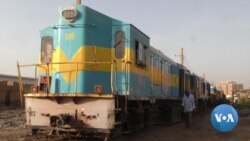Sudan once had the largest railway network in Africa, with most of the train cars obtained from the United States. But decades of negligence, economic troubles, and U.S. sanctions have made the railway reliant on Chinese-made trains and parts that it can hardly afford. With the recent ouster of Omar al-Bashir, the railway's supporters are hoping the United States will soon lift sanctions to help restore it to its former glory.
Sixty-five-year-old Mahdi Yassin has been working for the Sudan Railways Corporation since 1972.
WATCH: Neglected railway in South Sudan
Yassin remembers the railway's glory days, when it was the largest in Africa, running 5,000 kilometers (3,100 miles) from the Egyptian Red Sea and crisscrossing Sudan to what is now South Sudan.
Yassin said Jebait school was graduating one hundred students per year - all qualified to work on the railway. It was a strong corporation. There was abundance in spare parts and locomotives.
But the railway fell apart through mismanagement and a fear of organized labor's influence on the economy and politics.
Now, railway workshops in Sudan look like a graveyard, littered with dozens of vehicles, some of them idle for decades.
Sudan fired thousands of qualified rail workers, replacing some with political appointees put in place after former president Omar al-Bashir came to power.
Railway workers hope Bashir's ouster in April will encourage the United States to lift sanctions it imposed on Sudan for human rights abuses and harboring terrorists.
Mahmoud Salih, director of engineers in the Khartoum train workshop, said if the sanctions are lifted, they can at least be updated with the technology of the trains. Salih added that Sudan is so late to update the current technology, it's functioning with the past century's technology, they need to update and then develop.
After the British colonial era, the state-run railway became reliant on U.S. trains and replacement parts. But because of sanctions, Khartoum has been unable to buy U.S. parts leaving only 18 of the railway's 106 U.S.-made trains in service.
Sudan Railways corporation director Mohamed Hamid said the railway turned to China to keep the trains running.
Hamid said when the U.S. embargo cut out everything; they had to import their spare parts and needs from other countries. He said that they resorted to China, they have the American locomotives and, of course, China cannot produce the American spare parts, especially the main machines from Caterpillar (Inc.), so what they were going to do?
Importing a few Chinese trains in 2014 allowed Sudan to launch two new passenger lines. But poor track conditions means the trains can only go 60 kilometers per hour - half their maximum speed.
Before Yassin retires at the end of this year, he hopes to see U.S. sanctions lifted and more efforts by Sudan's transitional government to get the country's railways back on track.











